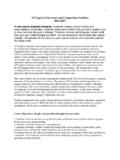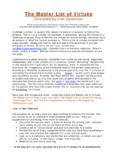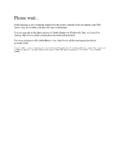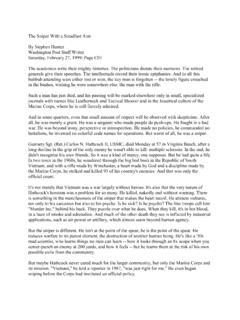Transcription of Rethinking Integrity - Accompli
1 Leader to Leader, No. 28 Spring 2003 Rethinking IntegrityAMIDan epidemic of corporate fraud, as top-level executives areled away in handcuffs, trusted accounting systems fail, multibillion-dollar bankruptcies abound, and suspicions spread that markets arerigged, public faith in corporate leaders continues to deteriorate ina seep of corruption. A recent cartoon captures the mood: In thefirst panel, Dilbert says, Then our new CEO backed up a movingvan to the building and robbed us. Asked what the board ofdirectors did to protect the company s assets, Dilbert cynicallyresponds, After loading the van? As a society, we have been quick to condemn those accused ofwrongdoing at companies including Enron, WorldCom, ArthurAndersen, Tyco, and many Wall Street firms; we have debated theneed for stricter rules and tougher enforcement.
2 The feeling ofoutrage is real and the call for justice must be satisfied; yet inquiryinto root causes is equally important. It s time to ask, What hasbecome of our Integrity ?We are each responsible for our own Integrity ; the best of us cre-ate environments that nourish the Integrity of others. It is after wehave contemplated our own actions, measuring how they alignwith our values, intentions, and words, that we are most likely tomake a contribution of Integrity to the world. Prominent thinkersincluding Warren Bennis, John W. Gardner, James M. Kouzes, andBarry Z. Posner (see Challenge Is the Opportunity for Greatness, by Kouzes and Posner) long ago established the connectionbetween personal Integrity and the ability to lead; as FrancesHesselbein often says, Leadership is a matter of how to be, nothow to do.
3 That kind of leadership leadership of Integrity is what s needed of the difficulty is that the idea of Integrity often gets confusedwith compliance. Rules, mores, and personal Integrity can all furthersocially beneficial conduct. Think of this triad as three circles that over-lap in the manner of the old Ballantine s beer logo. At the center, thethree elements collaborate so completely to encourage good behavioras to be indistinguishable from one another. Yet beyond that center,each governs a distinct and substantial domain of its own. nLaws, rules, and regulationsset enforceable limits beyond whichpersonal choice is not permitted. nMoresdefine our shared understanding of what is right, good,and worthy. nIntegrity is uniquely concerned with individual wholeness andconscience the quality of being true to oneself.
4 During the last decades ofthe 20th century therevolutionary 1960s, thedismal 1970s, the slash-and-burn 1980s, the bub-ble 1990s a riot ofsocial change trampledover the very meaning ofthe word in the UnitedStates, the trend has beento enhance the regulatoryfunction, unintentionally atthe expense of a sharedsense of morality and ofpersonal Integrity . When asociety shifts its emphasisto explicit rules,a trade-off may occur, asattention withdraws fromsubtle, ineffable matters ofbelief and conviction. Byevidencing distrust, rulescan discourage the devel-opment of values. ExplainsJeffrey E. Garten, deanof the Yale School ofManagement and authorof The Politics of Fortune: A New Agenda for Business Leaders, When you re over-regulated, you begin to gear the system tocomply with the regulations in such a way that you re adhering tothe letter of the law but the actual spirit of it has totally evapo-rated.
5 Whether rulemaking has reached that extreme in our soci-ety remains debatable, but the evaporation of spirit Gartenidentifies is a trend that many recognized long much seems obvious: An organization intending to promoteintegrity should promote individuals possessed of it. Similarly, theleader who would promote Integrity ought to embody it. But ..embody what, exactly? Do we have a shared understanding of thequality that we call Integrity ? 1By Stratford ShermanStratford Sherman is a writer,executive coach, and confer-ence moderator. He has deliv-ered keynote speeches andseminars worldwide on leader-ship, technology, and competi-tive response. His publicationsinclude the best-selling casestudy of General Electric,Control Your Destiny orSomeone Else Will, which hecoauthored with Noel Tichy.
6 (3/2003) FromLeader toLeader, No. 28 Spring 2003 Rethinking Integrity Stratford Sherman2In Search of IntegrityDICTIONARIES, which record precise definitions for words at par-ticular points in time, show how the meaning of the word integrityadapted to social change. Let s start with the Oxford EnglishDictionary, Britain s conservative, authoritative source of definitionsgrounded in the bedrock of centuries of use. The s principaldefinition of Integrity is: The condition of having no part or ele-ment taken away or wanting; undivided or unbroken state; mate-rial wholeness, completeness, entirety. In its root, the word is related to integerand integration, whichspeak of unity and wholeness.
7 We still use the word in this originalsense when we talk about structural Integrity , the quality thatenables a building to stand and that, when lost, lets a buildingcollapse under its own metaphorical extension of this idea related Integrity to humanbehavior. By the middle of the 16th century, shortly after Henry VIII,common usage had added a second meaning: The condition ofnot being marred or violated; unimpaired or uncorrupted condition;original perfect state, soundness. A small leap led to a third mean-ing explicitly referring to human character: Unimpaired moralstate; freedom from moral corruption; innocence, sinlessness. The sterse definitions distill centuries of consideration ofthe nature of humanity.
8 The definition of moral Integrity as a lackof corruption arises from a view of human nature as originally pureand good unless and until it is spoiled. This underlies the tradi-tional idea that people are born with a conscience that can pro-vide reliable inner guidance about right and wrong. RememberJiminy Cricket singing, Let your conscience be your guide inDisney s Pinocchio? The notion is not simply a matter of popularbelief, however. The criminal jurisprudence of both England andthe United States operates with the firm presumption, validated bypractical experience, that sane adults can tell right from that in mind, let s see how Americans understanding haschanged. In the second edition of Merriam-Webster s Dictionary,published in Springfield, Massachusetts, in 1959, the definition ofintegrity is similar to the s.
9 Here too, the principal definitionconcerns wholeness. As in the , the ethical sense of theword arises in the third definition, which reads, moral soundness;honesty; freedom from corrupting influence or practice; esp. strict-ness in the fulfillment of contracts, the discharge of agencies,trusts, and the like. Much of this definition is traditional, demon-strating an unbroken connection to the original meaning. ButWeb2, as professional wordsmiths refer to this authoritative dic-tionary, has introduced something new: a practical, Americanconcern with the fulfillment of legal and commercial , the comparison of Web2with the society circa 1959 and English society circa 1659 shared afairly similar understanding of 10th edition of Merriam-Webster s Collegiate Dictionary, pub-lished in 1993 and still the prevailing standard, shows howmuch our society has changed.
10 In Web10, the ethical sense ofintegrity is promoted to the primary definition: firm adherence toa code of esp. moral or artistic values: incorruptibility. Dictionarywriters choose their words with great care, and the key word hereis adherence, which introduces another novelty. Before, integrityhad been part of the identity of a person. But as of Web10integrity required adhesion: rather than being an integral part ofwho we are, Integrity became something outside us, which had tobe glued on. External rules, as represented by the code of val-ues, have moved to the fore, shoving aside the idea of an uncor-rupted original state. The concept of wholeness, once the coremeaning, has been relegated to definition No. in the days of Web2, when Eisenhower was president,Americans still more or less believed that people possess an innatesense of goodness capable of reliably guiding their actions.







